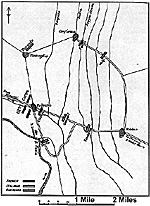Historical Battle:
The battle began as the French attempted to make a flank march around the Austrian right. Of the three routes into Lombardy, the first two were closed; being blocked by the Austrian fortifications at Piacenza and the Austrian main body between the Sesia and Ticino while the flank march would lead circuitously to the Lombard capital, Milan.
The Austrian commander, FML von Gyulai, was still convinced that it was his army's left flank that was in danger. Reports of the Piedmontese advance were dismissed as a diversion, however, Gyulai resolved to send a reconnaissance in force against them to determine their intentions.
FML Zobel was ordered to take his corps of 14,000 men and 40 guns and drive toward Palestro, driving back any Piedmontese encountered and then seizing the town..
At 10:00 hours, the Austrian center column under Dorndorf attacked and drove back the 10th Piedmontese infantry. The 6th Bersaglieri and part of the 15th Line counterattacked and drove back the Austrians. Austrian reinforcements under Koudelka were brought up and the result was the Piedmontese were pushed back the Palestro cemetery. Rallying behind the stone walls of the cemetery, the Piedmontese were able to check the advance of the Austrians, and with the help of the 6th Bersaglieri the Austrians were pushed back to Robbio.
Things were not going well for the Austrian left column. Szabo was initially successful in driving in the Piedmontese piquets, and had nearly managed to gain a toe-hold in the southem outlying village. His brigade was then hit head on by the 7th Bersaglieri, and on the flank by the 3rd Zouaves.
The Zouaves
The Zouaves were led by none other than King Victor Emmanuel himself, who had been watching the battle from the bell tower of a nearby church. The Zouaves made a sudden dash across the Sesietta stream and fell on with the bayonet. Szabo's brigade was sent back reeling with nearly a thousand casualties and seven guns lost.
The Austrian attack on the right was also repulsed, as Gen. Weigl's column, barely numbering 1000 effectives, ran into a full Piedmontese division at Confienza. By 13:00 hours the battle was over; the Austrians falling back with losses of 2100 killed, missing and wounded. The strategic result of the battle was the realisation by Gyulai that it was his right flank that was threatened and not his left. This caused him to fall back across the Tincino and await the Allies at Magenta.
The Forces:
Austrians; FML Zobel
Right Column
- 1st Brigade/VII Corps (de Lilia's Div.); GM Weigl
- 53rd Line: Grenadier Btn, 1st and 2nd Btns 6# Battery
Center Column
- 2nd Brigade/VII Corps (de Lilia's Div.); GM Dorndorf
- 1st Grenz Btn
22nd Line; Grenadier Btn, 1st and 2nd Btns
6# Battery
Rocket Battery
2nd Brigade/II Corps (Jellacic's Div.); GM Koudelka
- 21st Jagers
46th Line; Grenadier Btn, 1st and 2nd Btns
6# Horse Artillery Battery
Left Column
- 1st Brigade/II Corps (Jellacic's Div.); GM Szabo
- 7th Jager Btn
12th Line; Grenadier Btns, 1st, 2nd, 3rd Btns
6# Battery
Konig bei Sicilien Uhlans
Piedmontese
2nd Piedmontese Division; Lt. Gen. Fanti
- Piemonte Brigade; MG Molari
- 3rd Line
4th Line
9th Bersaglieri
Aosta Brigade
-
5th Line
6th Line
1st Bersaglieri
2 batteries 8# sb
1 battery 16# hsb
4th Piedmontese Division; MG Cialdini
-
Regina Brigade; Col. di Villamarino
-
9th Line
10th Line
7th Bersaglieri
Savona Brigade; MG Broglia
-
15th Line
16th Line
6th Bersaglieri
2 batteries 8# sb
1 battery 16# sb
French
- 3rd Zouave Reg.
2 batteries 6# Napoleons
Wargaming the Scenario:
 Set Up:
Set Up:
Austrians enter along the road at Robbio, where the roads from Palestro and Conhenza meet. Piedmontese 2nd Division sets up defending Confienza. Piedmontese 4th Division sets up defending Palestro. French set up immediately south of Palestro.
Map reprinted from "The Campaign of Magenta and Solferino" by Col. H. C. Wylly. © 1996 by The Absinthe Press, PO Box 19142, Minneapolis, MN 55419
Large Map (slow: 95K) Austrians must drive the Allied forces back from Patestro and/or
Confienza and hold either town in order to win. The Allies must prevent this.
Tactical Notes: To add an element of suspense, do not start the
French on the board, but dice for their entry. On a d10, roll the turn number
or less for French entry.
The ground is covered with rice fields and cut by deep irrigation channels,
making for rough terrain. Unimpared crossing is only possibe by the main
road and the country tracks that connect the villages.
-Finis-
Jumbo Map (very slow: 319K)
Victory Conditions:
Back to Clash of Empires No. 2 Table of Contents
Back to Clash of Empires List of Issues
Back to Master Magazine List
© Copyright 1997 by Keith Frye
This article appears in MagWeb (Magazine Web) on the Internet World Wide Web.
Other military history articles and gaming articles are available at http://www.magweb.com